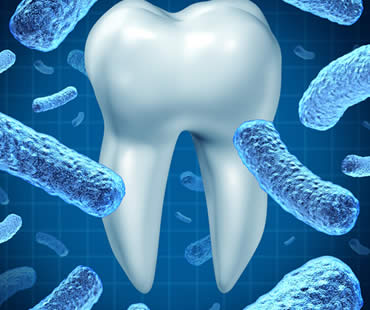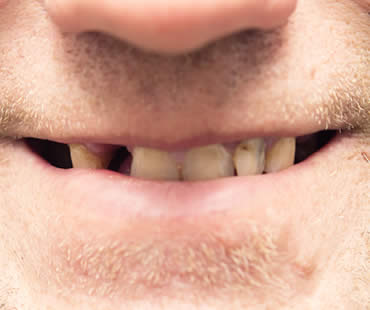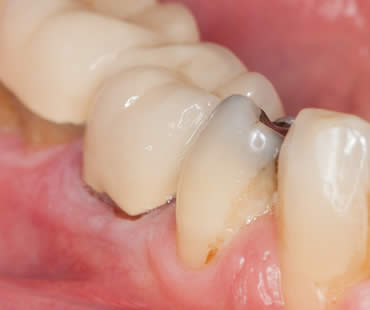
Any stage of gum disease (or gingivitis) can cause inflammation, pain, and sensitivity. It can make eating and talking difficult. It’s important to know what causes gum disease and what can happen if it develops, so that you can avoid it altogether or at least catch it before it wreaks havoc on your mouth.
What causes gingivitis?
Plaque buildup is the main cause of gum disease, although other factors can lead to it as well. These include:
- Illnesses, especially those that interfere with your immune system. Patients with HIV, diabetes, and cancer are often at higher risk for gingivitis.
- Hormonal changes associated with pregnancy, menstruation, puberty, and menopause.
- Some medications affect oral health by decreasing saliva or causing abnormal growth of gum tissue.
- Smoking can hamper the healing of your gums.
- Poor dental hygiene, including neglecting brushing or flossing, or using improper techniques.
- Family history of gum disease.
What are the symptoms?
Gingivitis can sneak up without symptoms, even in the later stages of the disease. However, there are signs that may point to some level of gingivitis. These include bleeding, red, or swollen gums. Ongoing bad breath and receding gums are other symptoms. Deep pockets may form between the teeth and gums, and teeth may shift or loosen. You might also notice changes in how your teeth fit together when you bite down. Your dentist can recognize symptoms even if you don’t, so make sure you have checkups regularly.
How is gingivitis treated?
Treatment depends on the stage of your gum disease, how you responded to previous treatment, and your general health. Treatments range from therapies to control bacterial growth to surgery to restore gum tissue. Often gingivitis can be controlled with dental visits and good dental hygiene.
What can happen without treatment?
Gingivitis may advance to periodontitis, causing permanent damage to your mouth. Advanced gum disease has been linked to stroke, heart disease, rheumatoid arthritis, and diabetes complications.
Are dental issues holding you back? Take control of your oral health by booking an appointment with our experienced team at our Toronto dental office.

Whether you call it pop, soda, soft drink, or something else, these terms all refer to a sugary, carbonated drink popular all over the country. It is estimated that Americans consume over 13 billion gallons of soft drinks each year. These beverages can cause serious health problems, including negative effects on your oral health.
Soft drinks are one of the most significant reasons for tooth decay, and it impacts all age groups. From babies drinking it out of bottles to teenagers drinking it all day long to older adults sipping it in retirement homes, it is deteriorating tooth enamel and eroding gums of everyone who consumes it.
Why are soft drinks harmful?
The high sugar content in the drinks is the root cause of trouble, and the high acid content adds to the threat. The sugar combines with bacteria in your mouth to create an acid, which adds to the acid from the drink itself. Then this mixture attacks your teeth. Each time you take a drink of the carbonated beverage, an acid attack begins in your mouth. During this time, your tooth enamel is weakened and cavities are just waiting to form. You may think that the risk goes away by drinking sugar-free soft drinks. Although these are less harmful, they are still acidic and can lead to decay.
How can I avoid harming my teeth?
The ideal way to rule out risks from soft drinks is to cut them out of your diet completely. If you think you just can’t live without them, here are some suggestions:
- Substitute other drinks. Try drinks with less sugar, like 100% fruit juice and milk.
- Set a good example. Drink alternatives yourself and encourage your kids to do the same.
- Sip with straws. This helps keep the sugar from direct contact with your teeth.
- Rinse with water. After drinking a soda, rinse your mouth with water to reduce the amount of sugar and acid hanging onto your teeth and gums.
- Use fluoride toothpaste and mouth rinse. Using fluoride in your daily dental routine helps to reduce decay and strengthen enamel. Also ask your dentist about the possible need for professional fluoride treatments.
Are dental issues holding you back? Take control of your oral health by booking an appointment with our experienced team at our Toronto dental office.

Reaching for a sports drink may seem like a smart way to rehydrate during a big game or after completing your exercise regimen, but you may not be as educated as you think. Consumption of sports drinks is on the rise, with 62 percent of American teenagers drinking at least one a day. That’s why it’s important to inform consumers that these drinks which are touted to help your body can also take a toll on your health, at least on your oral health. Let’s find out exactly how sports drinks can negatively impact your teeth.
What makes sports drinks harmful?
You might guess that sugar is what makes these drinks less appealing. It’s true that you should avoid the brands heavy in sugar, but that’s actually not your teeth’s biggest enemy in sports drinks. It’s the high acid content that presents the most danger. Researchers have found that sports drinks have so much acid that they can start damaging your teeth after just five days of regular consumption.
Aren’t they better than drinking soda?
Most people choose these drinks thinking they will enhance their sports performance, and that they’re a better option than soda. Sports drinks are not that different than soda because they contain as much or more sugar. It’s simply not true that sports drinks are healthier for your teeth than soda.
What kind of damage can they do?
The acid in sports drinks can cause irreversible damage to your teeth. They erode your enamel, which is the shiny outer layer of your teeth, causing them to become sensitive to temperature changes and to touch. It also increases your risk of decay and cavities.
How can I avoid harming my teeth?
If you just can’t give up sports drinks, at least try to minimize the amount you consume. Rinse your mouth with water afterwards, but don’t brush your teeth immediately because it might spread the acid around your mouth. Wait about an hour for the pH level in your mouth to normalize, and then brush. You can also chew sugarless gum after having a sports drink, which increases your saliva flow and helps to return your mouth’s acidity levels back to normal.
Take the first step towards a confident smile. Contact our Toronto dental office to schedule your consultation!

The Importance of Oral Health for Middle Aged Folks
As we age, we begin to experience the effects of time on our bodies. One area that often gets overlooked is oral health.
Taking care of our teeth and gums becomes more important than ever as we hit middle age. Poor oral hygiene can lead to a range of issues, from tooth decay and gum disease to bad breath and even oral cancer.
One reason why oral health is so critical for middle-aged folks is that our bodies become less efficient at repairing themselves. This means that damage done to our teeth and gums can have long-lasting effects, making it essential to take preventive measures wherever possible.
A Brief Overview of Common Oral Health Concerns
Before diving into specific oral health concerns for middle-aged folks, it’s helpful to have a general understanding of what these issues are. Some common concerns include gum disease, tooth decay, bruxism (teeth grinding), dry mouth (xerostomia), bad breath (halitosis), and oral cancer. Gum disease is an inflammation of the gums that can cause tooth loss if left untreated.
Tooth decay occurs when bacteria breaks down enamel and dentin in our teeth, leading to cavities. Bruxism involves grinding or clenching your teeth while you sleep or during the day, which can cause headaches, jaw pain, and even chipped or cracked teeth.
Dry mouth occurs when there’s a lack of saliva production in our mouths due to certain medications or medical conditions. This can lead to bad breath and an increased risk for tooth decay.
Oral cancer can occur in any part of the mouth or throat and requires early detection for successful treatment. Now that we have a general understanding of these concerns let’s dive deeper into what they mean for middle-aged folks specifically.
Gum Disease: The Silent Oral Health Menace
Gum disease, also known as periodontitis, is a serious oral health issue that often goes undetected until it has caused significant damage. The condition is caused by an excess buildup of plaque and bacteria on the teeth and gums. As the bacteria multiply, they cause inflammation and bleeding of the gums, which can lead to tooth decay and even tooth loss if left untreated.
Causes and Symptoms
The primary cause of gum disease is poor oral hygiene habits such as infrequent brushing or flossing. Other factors that can contribute to gum disease include smoking, hormonal changes, diabetes, genetics, and certain medications. Symptoms of gum disease include bleeding gums while brushing or flossing, persistent bad breath or bad taste in the mouth, receding gums that make teeth appear longer than normal, loose teeth or shifting teeth that don’t fit together when biting down.
Prevention and Treatment Options
Preventing gum disease requires consistent oral hygiene practices such as brushing at least twice a day for two minutes each time, flossing daily before bedtime to remove any food particles lodged between teeth. Using an antimicrobial mouthwash will help kill germs in hard-to-reach places.
Getting regular dental check-ups every six months is also important because dentists can detect early signs of gum disease before it becomes more severe. Treatment options for gum disease depend on how advanced the condition has become but can range from deep cleaning procedures like scaling and root planing to surgical intervention in severe cases where bone loss has occurred.
Advanced cases may require periodontal surgery to restore tissue damage done by the bacteria. After treatment patients are given instructions on how best to maintain good oral hygiene habits so that they do not fall victim to this silent menace again in their middle age years especially since aging itself increases our susceptibility to gum disease.
Tooth Decay:
Causes and Symptoms:
One of the most common oral health concerns for middle-aged folks is tooth decay. Tooth decay occurs when the enamel on your teeth is weakened by acid, causing cavities or even tooth loss.
Poor dental hygiene and a diet high in sugar and carbohydrates are two major causes of tooth decay. Additionally, dry mouth or a decrease in saliva production can lead to tooth decay as saliva helps to neutralize acids in the mouth.
Symptoms of tooth decay include sensitivity to hot and cold temperatures, pain when biting or chewing, and visible holes or pits in the teeth. If you experience any of these symptoms, it’s important to see a dentist right away to prevent further damage.
Prevention and Treatment Options:
The best way to prevent tooth decay is through proper dental hygiene practices such as brushing your teeth twice a day, flossing daily, using fluoride mouthwash regularly, and visiting your dentist for routine cleanings and check-ups. In terms of treatment options, early-stage tooth decay can often be treated with fluoride treatments or fillings. However, if the decay has progressed too far, more extensive procedures may be necessary such as root canals or even extraction.
It’s important to address any signs of tooth decay early on as it can lead to more severe oral health problems down the line. By maintaining good dental hygiene habits and being proactive about seeing your dentist regularly, you can prevent tooth decay from becoming a major issue.
Teeth Grinding (Bruxism)
The Causes and Symptoms of Bruxism
Bruxism is the involuntary grinding, clenching or rubbing of teeth. It can happen while you’re awake or asleep, but most people who suffer from bruxism do so at night.
The exact cause of bruxism is not known, but it has been linked to stress, anxiety, sleep disorders, and certain medications. The symptoms of bruxism include jaw pain or stiffness, headaches, earaches, and worn or cracked teeth.
Prevention of Bruxism
There are several ways to prevent bruxism. Reducing stress through relaxation techniques such as yoga and meditation can help alleviate the condition.
Avoiding stimulating substances such as caffeine and alcohol before bedtime can also help reduce the likelihood of bruxism occurring at night. Wearing a mouthguard while sleeping is another effective prevention method.
Treatment Options for Bruxism
If you suspect that you suffer from bruxism, it’s important to consult with your dentist who can diagnose the condition and recommend treatment options. Treatment may involve a combination of lifestyle changes such as reducing stress levels through therapy or medication, wearing a mouthguard at night to protect your teeth from further damage caused by grinding or clenching during sleep or surgery in severe cases. If you are experiencing any symptoms related to teeth grinding , you should have your oral health evaluated by a dental professional right away in order to avoid further damage to your teeth and jaw area.
The Dangers of Dry Mouth (Xerostomia)
Are you experiencing a persistent feeling of dryness in your mouth? This might be because you are suffering from Xerostomia, or dry mouth. It is a common oral health issue that can lead to major problems if left untreated.
Causes and Symptoms
Xerostomia is caused by a decrease in the production of saliva, which can occur due to a variety of reasons. Some of these causes include certain medications, radiation therapy, dehydration, autoimmune diseases such as Sjogren’s syndrome, and nerve damage.
Symptoms of dry mouth include a constant feeling of thirst, difficulty swallowing food, cracked lips and tongue, bad breath, sore throat and gums that bleed easily. If you experience these symptoms frequently you should see your dentist.
Prevention and Treatment Options
The best way to prevent Xerostomia is to keep yourself hydrated at all times by drinking plenty of water throughout the day. Also consider chewing sugar-free gum or sucking on sugar-free candies as this promotes the production of saliva.
If your Xerostomia persists despite practicing good hygiene habits then it might be time to consult with your dentist about further treatment options such as medication or Botox injections. In some cases certain prescription medications are responsible for causing Xerostomia; if this is the case with you then speak to your doctor about changing medication or adjusting dosage.
It’s worth noting that people who suffer from Xerostomia also tend to have an increased risk for tooth decay and gum disease because there’s not enough saliva present in their mouths to wash away bacteria that cause these issues. So don’t ignore this condition!
Oral Cancer: Causes, Symptoms, Diagnosis, Treatment
Oral cancer is a serious disease that can be life-threatening if not detected and treated early. It is a type of head and neck cancer that affects the mouth, tongue, lips, throat, or gums.
The good news is that it is preventable and can be treated if caught in its early stages. Here are some important facts about oral cancer:
Causes
The exact cause of oral cancer is unknown. However, certain lifestyle choices increase the risk of developing it. Tobacco use (including cigarette smoking and smokeless tobacco), excessive alcohol consumption, and HPV (human papillomavirus) infection are some of the main causes of oral cancer.
Symptoms
The symptoms of oral cancer can be similar to those caused by other conditions such as gum disease or toothache. Some common symptoms include persistent mouth sores or ulcers that do not heal within two weeks; red or white patches in the mouth; swelling or lumps in the gums; persistent sore throat; difficulty swallowing or chewing; hoarseness or change in voice quality; numbness in the mouth or face.
Diagnosis
If you experience any symptoms associated with oral cancer for more than two weeks, you should see your dentist as soon as possible for an examination. Your dentist may perform a biopsy (removal and analysis of tissue) to determine if there are any abnormal cells present.
Treatment
Treatment options for oral cancer depend on several factors such as stage of the disease, location and size of the tumor(s), overall health condition of the patient etc. Common treatments include surgery to remove tumors followed by radiation therapy (or chemotherapy), radiation therapy alone (for smaller tumors) or a combination of these methods. Early detection greatly improves the chances of successful treatment and long-term survival.
Remember, prevention is always better than cure. To reduce your risk of oral cancer, avoid tobacco use, limit alcohol consumption, and practice good oral hygiene by brushing twice a day, flossing regularly and visiting your dentist for routine check-ups. Bad Breath: The Stinky Elephant in the Room
As we age, there’s one oral health concern that becomes increasingly noticeable: bad breath. Also known as halitosis, this condition can be a major source of embarrassment and social discomfort. But what causes bad breath, and what can you do to prevent it? Causes:
There are many different factors that can contribute to bad breath in middle aged folks. Some common culprits include poor oral hygiene habits (such as infrequent brushing and flossing), gum disease, dry mouth, smoking or tobacco use, certain medications or medical conditions (like diabetes), and even stress. In some cases, bad breath may also be a sign of more serious issues like oral infections or cancer. Prevention Tips:
The good news is that there are several simple steps you can take to prevent or reduce bad breath in middle age. First and foremost, be sure to brush your teeth at least twice a day (preferably after meals) with fluoride toothpaste and floss daily to remove food particles and bacteria from between teeth. You may also want to consider using an antimicrobial mouthwash to kill germs in your mouth.
In addition to good oral hygiene practices, there are some lifestyle changes you can make to help prevent bad breath. For example, if you smoke or use tobacco products, quitting will not only benefit your overall health but also improve the freshness of your breath.
Drinking plenty of water throughout the day can also help keep your mouth moist and flush out odor-causing bacteria. Another helpful tip is to watch what you eat – certain foods like garlic, onions, coffee or alcohol tend to leave a strong odor in the mouth long after they’ve been consumed.
If possible try cutting back on these types of foods or brushing after eating them. Make sure you see your dentist regularly for check-ups and cleanings.
They can catch any early signs of gum disease or decay and provide treatment to prevent further damage. By taking steps to maintain good oral health, you can keep bad breath at bay and enjoy fresh, healthy breath for years to come!
Maintaining good oral health is crucial for middle-aged people.
Gum disease, tooth decay, and teeth grinding are all common conditions that can cause painful and costly problems if left untreated.
Dry mouth and bad breath can also impact a person’s quality of life. Oral cancer is a serious concern that can be prevented with early detection.
The key takeaways from this article include the importance of regular dental check-ups and cleanings, daily brushing and flossing, a healthy diet low in sugar, and avoiding tobacco products. It’s also essential to recognize the signs and symptoms of these conditions so that they can be treated promptly.
Final thoughts on the importance of maintaining oral health in middle age
As we age, our bodies go through changes that affect our oral health. This means that taking care of our teeth and gums becomes even more critical as we get older.
Maintaining good oral health not only prevents painful dental problems but also has broader benefits for overall health. Studies have shown that poor dental hygiene is linked to heart disease, stroke, diabetes, and other chronic conditions.
By prioritizing our oral health in middle age, we can set ourselves up for a healthier future. With regular check-ups with a dentist or hygienist and by practicing good oral hygiene at home every day, we can maintain strong teeth and healthy gums well into our golden years.
Take the first step towards optimal oral hygiene. Reserve your dental appointment at our Toronto dental office now and experience personalized care.







 E-Mail Us
E-Mail Us  416-595-5490
416-595-5490








